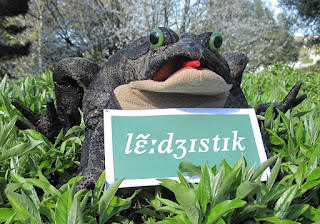The OED has a public appeal out for information on words developed in English as a result of the First World War. The word “demob” caught our attention:
The term demobilization, referring to the release of troops from military service at the end of a war, has been in use since the 19th century, but the abbreviated form demob seems to have been used only since the end of the First World War.
For comparison we’ve had a quick look for Jèrriais texts about demobilization in 1919. The most relevant seems to be an article by GW de Carteret about a “dîner des dêmobilisés” in Les Chroniques de Jersey of 15/11/1919. Which, as it happens, contained an interesting phrase:
“…fut jouôté avec une tonmate.” i.e. fut jouôté auvec eune tonmate
The verb jouôter basically means to throw (originally from taking part in the custom of la jouôte – throwing stones at poultry or other animals, a “joust”), From jouôter sus un lapîn – throwing stones at a rabbit, for example, the verb jouôter developed the meaning of throwing stones or throwing more generally. Throwing tomatoes in the context of a “demob dinner” in 1919 would not therefore be so surprising (in the slightly mad world of the Caouain‘s newspaper columns) apart from the passive construction “fut jouôté auvec eune tonmate” – was hit with a tomato. This implies that jouôter has been used in the same sense as the verb adèrchi – to hit (a target) – unless the meaning’s more like “had a tomato thrown at him”.
As for “demobbed”, the phrase which seems to have been in use in Jèrriais writings of the period is èrv’nu d’la dgèrre. The verbs “mobiliser” and “dêmobiliser” are, otherwise, well attested in Jèrriais.


